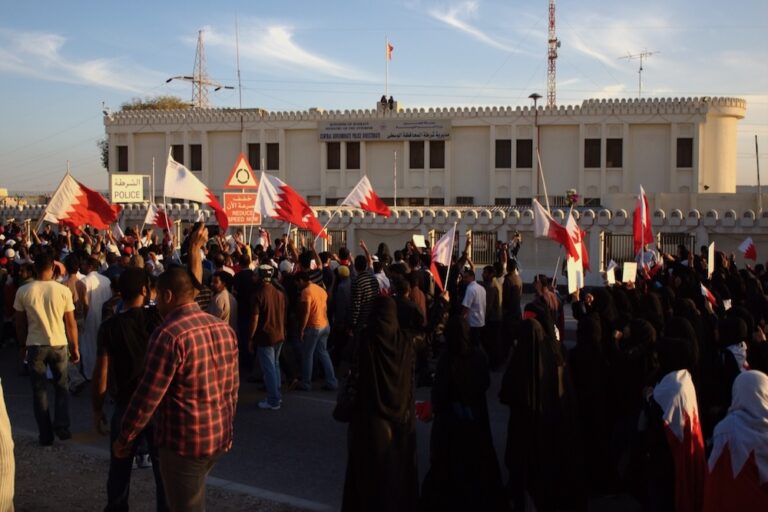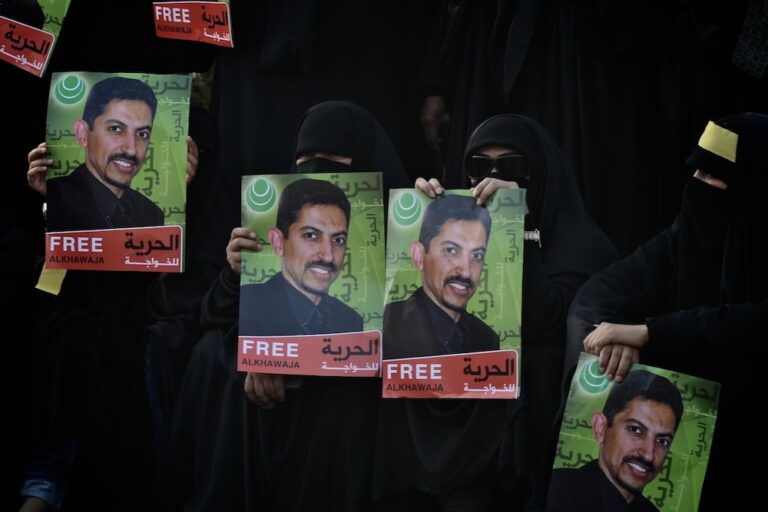(BCHR/IFEX) – The following is a statement from BCHR, an interim member of IFEX: The Bahrain Center for Human Rights is alarmed at allegations that the Bahraini government is employing “dirty” tactics, including espionage, in its campaign to subdue local activists. According to a statement given to the BCHR by his brother, a Bahraini man […]
(BCHR/IFEX) – The following is a statement from BCHR, an interim member of IFEX:
The Bahrain Center for Human Rights is alarmed at allegations that the Bahraini government is employing “dirty” tactics, including espionage, in its campaign to subdue local activists.
According to a statement given to the BCHR by his brother, a Bahraini man was offered a large sum of money by Public Security officials in exchange for information on, and access to, the home of Women’s Petition Committee head Ghada Jamsheer.
The man, who is from Muharraq and who previously worked in Jamsheer’s home to install a satellite receiver dish, said that he had been summoned to the Public Security building near the Interior Ministry Fort, where a Public Security official with a Jordanian accent had asked him for access to Jamsheer’s house and the location of her bedroom.
The man also alleged that the official had said that a small strip of transparent ribbon would be placed on Jamsheer’s bedroom wall.
Security officials were already in possession of a number of photographs of Jamsheer and her house from the outside, according to the man.
He claimed to have been offered a large amount of cash, which he refused.
According to article 12 of the Universal Declaration of Human Rights, “no one shall be subjected to arbitrary interference with his privacy, family, home or correspondence, or to attacks upon his honour and reputation. Everyone has the right to the protection of the law against such interference or attacks.”
As noted in the US State Department report on Human Rights Practices in Bahrain, the Bahrain “government continued to infringe on citizens’ right to privacy . . . Telephone calls and personal correspondence remained subject to monitoring. Police informer networks were extensive and sophisticated.”
These shocking allegations come in the wake of anonymous phone threats to Su’ad Fathallah after she criticized the government for its anti-women policies on a television discussion alongside Jamsheer.
Other related incidents include the alleged kidnapping and sexual assault of National Unemployment Committee activist Musa Abda’ali by plainclothes security forces last year (see “Bahrain: Human rights defenders under threat”, Amnesty International, 17 July 2006), and recent anonymous telephoned threats to Bahrain Youth Society for Human Rights Vice-President Hussein Jawad.
In the past, the government has used personal information to blackmail or threaten activists in order to silence them or stop their advocacy work.
“Elsewhere, human rights workers and activists are lauded and celebrated as national figures of respect,” BCHR president Abdulhadi Al Khawaja said.
“These tactics are deplorable, and unacceptable in a country which claims to be working towards democracy,” he added.
“The right to privacy for all individuals is a part of the new Bahraini constitution, which should be upheld and implemented by the Bahraini government if it is to be respected by both the Bahraini people and the International Community.”
The BCHR calls for an end to dirty tactics being used by the government against activists.
With the recent escalation in the targeting of activists, the BCHR holds the Bahraini government fully responsible for the wellbeing and safety of Jamsheer and her family, as well as other activists.


